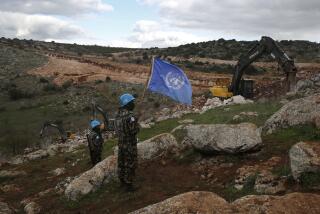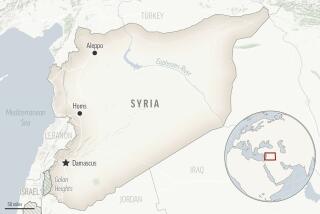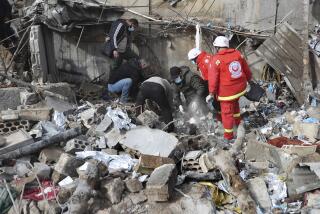11 Bloody Days, No End in Sight
Compiled by Times staff writers
The current fighting in Lebanon began July 12, and at least 360 Lebanese and 36 Israelis have died.
Here is a recap of major events so far:
July 12
Fighters with Hezbollah, the Shiite Islamic militia that controls much of south Lebanon, cross the border and attack an Israeli patrol, killing three soldiers and capturing two. Israeli troops pursuing the captors into Lebanon are ambushed, and five more are killed. Israel begins bombing targets in Lebanon, starting with roads and bridges leading out of the border region. Hezbollah chief Sheik Hassan Nasrallah holds a news conference in Beirut and vows that the Israeli soldiers “won’t be returned to their homes except through one way: indirect negotiations and a swap” for an unspecified number of Arab prisoners.July 13
Israel widens its campaign, bombing the runways at Beirut’s airport, blockading the coast and repeatedly hitting areas in south Beirut where Hezbollah has its headquarters. Airstrikes reportedly kill more than 50 in Lebanon. Hezbollah fires more than 100 Katyusha rockets into northern Israel, killing two people and wounding dozens. At least one rocket hits the coastal city of Haifa. The chief of staff of Israel’s army, Lt. Gen. Dan Halutz, warns that “nothing is safe” in Lebanon. President Bush says that the U.S. is “concerned about the fragile democracy in Lebanon” but that Israel has a “right to defend herself.” Saudi Arabia issues a statement condemning certain “elements” — a reference to Hezbollah — for “irresponsible acts” and saying those elements “should alone shoulder the burden of ending the crisis.”July 14
Nasrallah declares “open war” on Israel shortly after Israeli planes bomb the building in south Beirut where he lives and Hezbollah is headquartered. Hezbollah fires an Iranian radar-guided C-802 missile at an Israeli warship off the Beirut coast, crippling the ship and killing four sailors. The main highway from Beirut to Damascus, Syria, is closed, cutting off the last major supply route into Lebanon. The death toll reaches at least 73 in Lebanon, with about 200 wounded. In Israel, a woman and her 5-year-old grandson are killed by Hezbollah rockets. “We intend to break this organization,” Israeli Defense Minister Amir Peretz says of Hezbollah.July 15
Israeli airstrikes hit central Beirut for the first time, as well as targets as far north as Tripoli and east into the Bekaa Valley along the Syrian border. Hezbollah rockets hit the Israeli city of Tiberias, with about 90 rockets landing across northern Israel. Tens of thousands of Israelis flee to the south. Lebanese officials say that more than 100 have been killed and that except for two Hezbollah casualties, virtually all of the dead are civilians. On the Israeli side, 16 have been killed, including 12 military personnel. Several European countries begin evacuating their citizens from Lebanon. Fouad Siniora, Lebanon’s prime minister, pleads for a cease-fire, saying, “Destruction is raining down around the clock.” Bush says, “The best way to stop the violence is for Hezbollah to lay down its arms.” Arab League foreign ministers meeting in Cairo cannot agree on a policy.July 16
Eight Israelis are killed by a barrage of rockets in Haifa, bringing the Israeli death toll to 24. The attack in Haifa also injures at least 38. Nasrallah, in a televised speech, says Israel is “ignorant of what we have at all levels” and dares Israelis to fight on the ground. Israeli Prime Minister Ehud Olmert says the attacks on Haifa will lead to “far-reaching consequences.” U.S. officials begin helicopter evacuations of some Americans in Beirut. The leaders of major industrialized nations, who are meeting in Russia, split over a French call for an immediate cease-fire, with the U.S. opposed. The group issues a statement calling for Hezbollah to halt attacks and for Israel to exercise “utmost restraint.” The death toll in Lebanon exceeds 140.July 17
Britain and the United Nations call for an international peacekeeping force to be sent to south Lebanon. Olmert tells Italian Prime Minister Romano Prodi that Israel would insist in any truce that Hezbollah forces withdraw about 20 miles from the frontier but would not demand that the group be dismantled. The death toll in Lebanon passes 200, and Hezbollah rockets reach deeper into Israel. At the G-8 summit in Russia, an open microphone catches Bush in an unscripted moment telling British Prime Minister Tony Blair: “What they need to do is get Syria to get Hezbollah to stop doing this shit, and it’s over.” Syrian officials say more than 100,000 people have arrived from Lebanon seeking refuge.July 18
U.N. officials estimate that 500,000 Lebanese have fled their homes. Israeli officials indicate they plan to continue attacks for at least another week, saying they have destroyed a portion of Hezbollah’s arsenal, but not enough to stop the air assault. In addition to air attacks, commando units have been attacking Hezbollah positions in south Lebanon. The Bush administration continues to oppose calls for a cease-fire. In Lebanon, more than 230 people have been killed; in Israel the toll is 25. A cruise ship chartered by the U.S. government arrives in Beirut to evacuate Americans.July 19
Israeli planes drop 23 tons of bombs on what they believe is a bunker used by Hezbollah leaders. Hezbollah says no leaders were injured, and fires rockets into Israel, including some into the mostly Arab town of Nazareth, killing two Israeli Arab children. With the death toll in Lebanon over 300, U.N. High Commissioner for Human Rights Louise Arbour says both sides could bear “personal criminal responsibility” for shelling cities with civilian populations. Two Israeli soldiers and one Hezbollah guerrilla are killed in ground fighting inside Lebanon, the Israeli army says. U.S. officials work on a proposal for a buffer area patrolled by international peacekeepers in south Lebanon to keep Hezbollah away from the border. The cruise ship Orient Queen carries some 900 American citizens out of Beirut.July 20
Israel orders civilians across southern Lebanon to leave their homes, seeking to clear a swath nearly 20 miles deep, to the Litani River. Officials hint that expanded ground combat is to come. Thousands of fleeing Lebanese crowd roads to the north already heavily damaged by airstrikes. Nasrallah, in a television appearance, boasts of Hezbollah’s ability to withstand Israeli attacks. Hezbollah rocket fire into Israel diminishes. U.N. Secretary-General Kofi Annan calls for an immediate stop to the fighting but concedes that there are “serious obstacles to reaching a cease-fire, or even to diminishing the violence quickly.” The death toll is more than 330 Lebanese and 32 Israelis.July 21
Israel mobilizes reserves and masses tanks near the border in apparent preparation for expanded ground assaults. Relief workers say the number of dead in Lebanon is probably far higher than official estimates of 350 because many corpses lie unclaimed in border villages. Secretary of State Condoleezza Rice announces she will leave for the Middle East in two days but says an immediate cease-fire would offer only a “false promise” of safety. The U.S. will argue for a plan to suppress Hezbollah, halt arms resupply and strengthen the Lebanese government, officials say. Israel says that it has killed 100 Hezbollah guerrillas and that 34 Israelis, about half of them civilian, have died.July 22
Israel says it is not mounting a full-scale invasion, as army troops cross into Lebanon near the northern Israeli community of Avivim in the most extensive incursion so far, penetrating at least 2 1/2 miles in a swath six miles wide. Israeli forces take control of Maroun el Ras, a strategically valuable high point in an area the Israelis think is a launching pad for Hezbollah rockets, and uncover a large cache of weaponry, including antitank missiles and launchers, in nearby Marwaheen. Tens of thousands flee southern Lebanon. Israeli warplanes strike the southern port city of Sidon and communications towers in central and northern Lebanon. Hezbollah fires at least 90 rockets into Israel, strikingKiryat Shemona in the northern Galilee, Nahariya and the Haifa area. Lebanese and U.N. officials warn of a humanitarian crisis, estimating that at least 700,000 people have been displaced.
Compiled by Times staff writers
More to Read
Start your day right
Sign up for Essential California for news, features and recommendations from the L.A. Times and beyond in your inbox six days a week.
You may occasionally receive promotional content from the Los Angeles Times.






